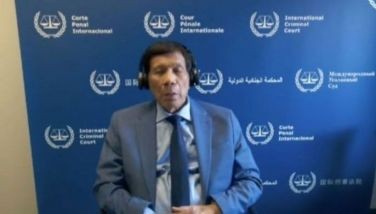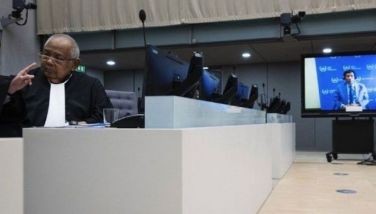Self-defense

October 11, 2006 | 12:00am
Someone was on the brink of producing weapons of mass destruction, and it wasn’t Iraq’s Saddam Hussein, though it wasn’t for lack of trying.
Unfortunately for Saddam, his country, which sits on the world’s second largest oil reserves, had greater strategic importance to a US-led Western alliance that was threatened by Islamic extremists financed in part by Middle Eastern petrodollars.
Now, with the Americans damned whether they leave or remain in Iraq, it turns out that it was another member of George W. Bush’s "axis of evil" that was nearing completion of a nuclear bomb.
And we thought US and South Korean spooks had Kim Jong-il so closely monitored they even knew his favorite websites. The platform shoes, the pompadour and quirky behavior had everyone fooled. "Dear Leader" didn’t have mere lucid moments all these years; he had been lucid all the way, working on his nuclear dream.
Our homegrown communists for once showed their true colors and praised the North Korean nuclear test as a courageous display of national sovereignty. Perhaps Kim will send them a shipment of Taepodong missiles in appreciation. The missiles can be shipped in easily through the unguarded coastal areas of Bongao, Tawi-Tawi or even through the Ilocos Region.
For sure we will hear similar noises about national sovereignty if ever Iran tests its own nuclear weapon.
The North Korean nuclear test revives debates on self-defense and national sovereignty and their place in a global village. Why should Western powers have a monopoly on nuclear weapons, or dictate which countries can develop nukes? North Korea called the test "a great leap forward" for the country and said it needed the nukes for a "powerful self-reliant defense capability."
Self-defense has also been invoked by all the members of the world’s elite nuclear club. We heard noises about self-defense and national sovereignty when France defied international pressure and went ahead with its underwater nuclear tests in the Tahitian atolls of Mururoa and Fangataufa.
At the time, Paris argued that it merely wanted to make sure its nuclear capability could in fact serve as an effective deterrent as it committed to join global non-proliferation efforts.
China issued similar explanations when it joined the nuclear club. India and Pakistan, engaged in an arms race, don’t want to be nuked out of existence.
Israel, surrounded by hostile neighbors, will never give up its nuclear capability. That capability is being used by neighboring countries as an excuse to develop their own nuclear weapons.
How can we tell where self-defense ends and aggression begins?
In the age of preemptive strikes and chaos in Middle Eastern geopolitics, the answer to this can be tricky.
Since an atomic bomb vaporized Hiroshima in 1945, we have seen how nuclear disarmament can be an impossible task. Possession is nine-tenths of the law here; no state is going to let go of its nukes, although it can promise to keep the WMD on ice.
Some states such as Japan have actually remained true to their word by using nuclear power for peaceful uses. But then Japan is under the security umbrella of the world’s lone superpower.
Being a nuclear power has become a status symbol especially for insecure regimes in the developing world. Their people might be starving and a big chunk of the population might be living in abject poverty, but leaders of such regimes believe nuclear weapons can prop up their rule.
All that the United Nations can do is extract a commitment from nuclear states that they aren’t going to nuke anyone with their weapons, or sell WMD to rogue states. Or, this being the age of Osama bin Laden, that the nukes – "dirty" bombs, missiles or the big-ticket items — will not be allowed to fall into the hands of al-Qaeda and its affiliates.
The international community is worried enough about nukes from the former Soviet republics falling into the wrong hands.
This is one of the concerns of the international community: that Kim Jong-il, when supplies in his pantry run low, will start selling WMD to anyone interested.
Pyongyang does not appear to have the capability yet to mass-produce WMD for global distribution. But the international community has underestimated Kim before.
In a moment of acute boredom, he might even deploy a nuclear warhead to Seoul, or break his country’s ceasefire with neighboring China, or send nukes to Japan, or Guam, or why not, the Philippines.
That possibility may still be years away, but it has not been discounted by those potential targets.
We can do nothing but wait for the bomb to explode, and then hope there will be enough survivors to clean up the mess. Other countries, notably Japan, will be considering their own self-defense capability against nuclear attack.
Japan, whose new Prime Minister Shinzo Abe is part of that country’s post-war generation, is seen to be moving toward developing a regular army with capabilities commensurate to its economic power.
The Japanese peace constitution may have to be rewritten, but Abe and other members of his generation do not bear the burden of guilt over Japan’s aggression during World War II. They don’t see building a regular national army as militarization but merely part of normal self-defense.
Japan’s victims during the war, including the Chinese and Koreans, have long memories and are jittery over these new developments in Tokyo.
No matter what the United Nations decides to do, North Korea’s successful nuclear test will start an arms race of sorts in this part of the world.
Unfortunately for Saddam, his country, which sits on the world’s second largest oil reserves, had greater strategic importance to a US-led Western alliance that was threatened by Islamic extremists financed in part by Middle Eastern petrodollars.
Now, with the Americans damned whether they leave or remain in Iraq, it turns out that it was another member of George W. Bush’s "axis of evil" that was nearing completion of a nuclear bomb.
And we thought US and South Korean spooks had Kim Jong-il so closely monitored they even knew his favorite websites. The platform shoes, the pompadour and quirky behavior had everyone fooled. "Dear Leader" didn’t have mere lucid moments all these years; he had been lucid all the way, working on his nuclear dream.
Our homegrown communists for once showed their true colors and praised the North Korean nuclear test as a courageous display of national sovereignty. Perhaps Kim will send them a shipment of Taepodong missiles in appreciation. The missiles can be shipped in easily through the unguarded coastal areas of Bongao, Tawi-Tawi or even through the Ilocos Region.
For sure we will hear similar noises about national sovereignty if ever Iran tests its own nuclear weapon.
Self-defense has also been invoked by all the members of the world’s elite nuclear club. We heard noises about self-defense and national sovereignty when France defied international pressure and went ahead with its underwater nuclear tests in the Tahitian atolls of Mururoa and Fangataufa.
At the time, Paris argued that it merely wanted to make sure its nuclear capability could in fact serve as an effective deterrent as it committed to join global non-proliferation efforts.
China issued similar explanations when it joined the nuclear club. India and Pakistan, engaged in an arms race, don’t want to be nuked out of existence.
Israel, surrounded by hostile neighbors, will never give up its nuclear capability. That capability is being used by neighboring countries as an excuse to develop their own nuclear weapons.
How can we tell where self-defense ends and aggression begins?
In the age of preemptive strikes and chaos in Middle Eastern geopolitics, the answer to this can be tricky.
Some states such as Japan have actually remained true to their word by using nuclear power for peaceful uses. But then Japan is under the security umbrella of the world’s lone superpower.
Being a nuclear power has become a status symbol especially for insecure regimes in the developing world. Their people might be starving and a big chunk of the population might be living in abject poverty, but leaders of such regimes believe nuclear weapons can prop up their rule.
All that the United Nations can do is extract a commitment from nuclear states that they aren’t going to nuke anyone with their weapons, or sell WMD to rogue states. Or, this being the age of Osama bin Laden, that the nukes – "dirty" bombs, missiles or the big-ticket items — will not be allowed to fall into the hands of al-Qaeda and its affiliates.
The international community is worried enough about nukes from the former Soviet republics falling into the wrong hands.
This is one of the concerns of the international community: that Kim Jong-il, when supplies in his pantry run low, will start selling WMD to anyone interested.
Pyongyang does not appear to have the capability yet to mass-produce WMD for global distribution. But the international community has underestimated Kim before.
In a moment of acute boredom, he might even deploy a nuclear warhead to Seoul, or break his country’s ceasefire with neighboring China, or send nukes to Japan, or Guam, or why not, the Philippines.
That possibility may still be years away, but it has not been discounted by those potential targets.
We can do nothing but wait for the bomb to explode, and then hope there will be enough survivors to clean up the mess. Other countries, notably Japan, will be considering their own self-defense capability against nuclear attack.
Japan, whose new Prime Minister Shinzo Abe is part of that country’s post-war generation, is seen to be moving toward developing a regular army with capabilities commensurate to its economic power.
The Japanese peace constitution may have to be rewritten, but Abe and other members of his generation do not bear the burden of guilt over Japan’s aggression during World War II. They don’t see building a regular national army as militarization but merely part of normal self-defense.
Japan’s victims during the war, including the Chinese and Koreans, have long memories and are jittery over these new developments in Tokyo.
No matter what the United Nations decides to do, North Korea’s successful nuclear test will start an arms race of sorts in this part of the world.
BrandSpace Articles
<
>
- Latest
- Trending
Trending
Latest
Latest
Recommended

April 28, 2025 - 12:00am

April 26, 2025 - 12:00am
























